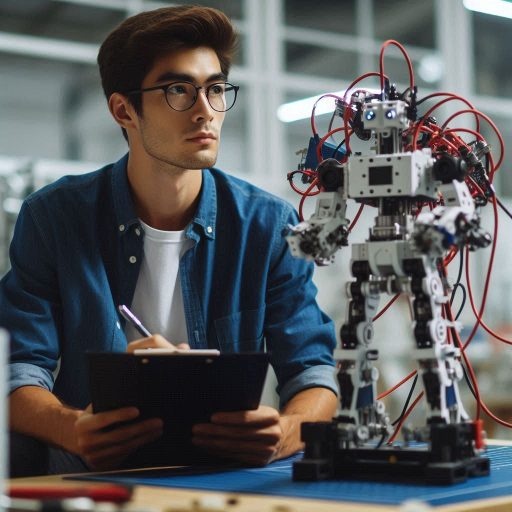Introduction
Robotics Engineers and AI Engineers are pivotal roles in today‘s tech landscape.
Both are crucial for advancing technology, yet they differ significantly in their focus and applications.
- Robotics Engineers design, build, and test robots and automated systems.
They focus on hardware and software integration to create functional machines that can perform specific tasks. - AI Engineers develop algorithms and models to enable machines to think, learn, and make decisions.
Their work revolves around artificial intelligence, machine learning, and data science.
Both roles are becoming increasingly popular as the tech industry evolves.
Companies are now seeking professionals who can drive innovation in robotics and artificial intelligence.
With the surge in automation, smart systems, and artificial intelligence, the demand for both Robotics and AI Engineers is rapidly growing.
This trend reflects the tech industry’s need for professionals with specialized skills to shape the future.
Understanding the key differences between these roles can help aspiring tech enthusiasts make informed career choices.
Educational Background
Educational Requirements For Becoming A Robotics Engineer
Becoming a robotics engineer typically begins with obtaining a bachelor’s degree in a relevant field.
Common degrees include robotics engineering, mechanical engineering, or electrical engineering.
Robotics is a multidisciplinary field that requires a solid foundation in both mechanical systems and electronic systems.
Bachelor‘s Degree
- Mechanical Engineering: Provides a comprehensive understanding of mechanical systems, dynamics, and control systems.
- Electrical Engineering: Focuses on electronic systems, circuits, and control systems, essential for integrating electronics with robotics.
- Robotics Engineering: A specialized degree that covers all aspects of robotics, including mechanical design, control systems, and programming.
For those seeking to advance in the field, a master’s degree or a Ph.D. can be highly beneficial.
Advanced degrees often involve deeper specialization and research opportunities.
Master‘s Degree
- Robotics Engineering: Offers advanced knowledge in areas such as autonomous systems, advanced control systems, and robotics programming.
- Mechatronics: Combines mechanical, electrical, and software engineering, offering a well-rounded approach to robotics.
Ph.D.
A Ph.D. in Robotics, Autonomous Systems, or Human-Robot Interaction allows for deep research into specific areas of robotics.
It is often required for positions in academia or advanced research roles.
Beneficial Courses
- Control Systems: Teaches how to design and manage robotic control systems.
- Embedded Systems: Focuses on integrating computer systems into robotics hardware.
- Robot Kinematics and Dynamics: Covers the movement and forces involved in robotic systems.
- Sensor Integration: Involves understanding how robots use sensors to interact with their environment.
- Machine Learning: Useful for developing intelligent behaviors in robots.
Educational Requirements For Becoming An Ai Engineer
AI engineering focuses on the design and implementation of algorithms that allow machines to learn from data and make decisions.
The educational path for AI engineers often starts with a bachelor’s degree in computer science, artificial intelligence, or a related field.
Bachelor‘s Degree
- Computer Science: Provides a foundation in programming, algorithms, and data structures, which are crucial for AI development.
- Artificial Intelligence: A specialized degree focusing on AI principles, algorithms, and applications.
- Data Science: Emphasizes data analysis and statistical methods, which are essential for machine learning.
To progress in the AI field, pursuing a master’s degree or a Ph.D. can provide advanced knowledge and research opportunities.
Master‘s Degree
- Machine Learning: Focuses on algorithms and techniques used in training AI models.
- AI: Covers advanced topics in artificial intelligence, including deep learning and neural networks.
- Data Science: Offers an advanced understanding of data processing and analysis, which supports AI model development.
Ph.D.
A Ph.D. in AI, Deep Learning, or Natural Language Processing allows for extensive research into specific AI technologies and applications.
It is often necessary for leading research projects or academic roles.
Beneficial Courses
- Machine Learning: Teaches how to develop algorithms that enable machines to learn from data.
- Deep Learning: Focuses on neural networks and their applications in AI.
- Neural Networks: Covers the architecture and functioning of neural networks used in AI.
- Data Structures and Algorithms: Provides a foundation for efficient programming and problem-solving in AI.
- Natural Language Processing (NLP): Essential for developing systems that understand and process human language.
Comparison
Core Focus
- Robotics Engineers: Concentrate on integrating mechanical and electronic systems to create functional robots.
- AI Engineers: Focus on developing algorithms that allow machines to process data, learn from it, and make decisions.
Coursework
- Robotics Engineers: Courses in control systems, embedded systems, and robotics-specific subjects are crucial.
- AI Engineers: Courses in machine learning, deep learning, and data science are critical. Their education focuses on programming, algorithm design, and data handling.
Advanced Degrees
- Robotics Engineers: Advanced degrees often emphasize specialized areas within robotics, such as autonomous systems or human-robot interaction.
- AI Engineers: Advanced degrees are focused on advanced AI methodologies, including deep learning and natural language processing.
Understanding these educational pathways helps align career goals with the right academic preparation.
This approach ensures a well-rounded preparation for specialized fields in robotics and artificial intelligence.
Read: How to Build a Strong CAD Technician Portfolio
Job Responsibilities
The Typical Job Responsibilities Of A Robotics Engineer
Robotics engineers focus on designing, developing, and maintaining robotic systems.
Their job responsibilities include:
- Designing Robotic Systems: Create blueprints and models for robots. Integrate sensors, actuators, and controllers.
- Programming Robots: Develop and write code to control robot movements and functionalities.
- Testing and Calibration: Run tests to ensure robots function correctly. Adjust and calibrate systems based on test results.
- Maintenance and Troubleshooting: Perform regular maintenance on robotic systems. Diagnose and fix mechanical or software issues.
- Collaborating with Teams: Work closely with mechanical, electrical, and software engineers. Coordinate to integrate different system components.
- Prototyping and Iteration: Build and refine prototypes. Iterate designs based on performance and feedback.
Robotics engineers often work in industrial settings, manufacturing plants, or research labs.
Their tasks involve hands-on work with physical robots and complex machinery.
AI Engineer
AI engineers, on the other hand, focus on creating and implementing artificial intelligence algorithms.
Their job responsibilities include
- Developing AI Models: Design and train machine learning models to solve specific problems. Use large datasets to improve model accuracy.
- Programming and Coding: Write code to build and optimize AI systems. Utilize programming languages like Python or Java.
- Data Analysis: Analyze and preprocess data for training AI models. Ensure data quality and relevance.
- Model Testing and Evaluation: Test AI models to assess performance. Tune models to enhance their effectiveness.
- Integration and Deployment: Deploy AI solutions into existing systems or platforms. Ensure seamless integration with other technologies.
- Research and Innovation: Stay updated with advancements in AI technology. Experiment with new techniques and methodologies.
AI engineers primarily work with software and data, often in tech companies or research institutions.
Their tasks focus on virtual models and algorithms rather than physical systems.
Transform Your Career Today
Unlock a personalized career strategy that drives real results. Get tailored advice and a roadmap designed just for you.
Start NowKey Differences
- Focus Areas: Robotics engineers work with physical robots and mechanical systems. AI engineers focus on virtual models and algorithms.
- Daily Tasks: Robotics engineers engage in hands-on tasks like assembling and testing robots. AI engineers spend time coding and analyzing data.
- Work Environment: Robotics engineers often work in industrial or research labs. AI engineers typically work in tech companies or academic settings.
- Project Scope: Robotics projects involve building and refining physical robots. AI projects center around developing and improving software models.
Therefore, while both roles involve complex problem-solving and technology, robotics engineers deal with tangible, mechanical systems.
AI engineers work with abstract algorithms and data.
Each role requires distinct skills and approaches, tailored to their specific focus.
Read: Best Online Courses for CAD Technician Training
Skills and Qualities
The Key Skills And Qualities Needed To Succeed As A Robotics Engineer
Robotics engineers need a unique blend of skills and qualities to excel in their field:
- Mechanical Engineering Skills: Understand mechanical systems and components. Design and build physical robots.
- Electrical Engineering Knowledge: Work with circuits, sensors, and actuators. Ensure electrical systems function correctly.
- Programming Skills: Write code to control robotic systems. Use languages like C++ and Python.
- Problem-Solving Abilities: Troubleshoot mechanical and software issues. Develop innovative solutions for complex problems.
- Attention to Detail: Ensure precision in designs and calibrations. Avoid errors in robot functionality.
- Team Collaboration: Work with engineers from various disciplines. Communicate effectively to integrate different systems.
- Creativity: Design novel robotic systems and components. Approach problems with an inventive mindset.
These skills are crucial for building and refining robots, as well as ensuring their effective operation in various environments.
Skills and Qualities for AI Engineers
AI engineers require a different set of skills and qualities tailored to their domain:
- Machine Learning Expertise: Develop and train machine learning models. Understand algorithms and their applications.
- Programming Proficiency: Write and optimize code for AI systems. Use languages like Python, R, or Java.
- Data Analysis Skills: Analyze large datasets to train and validate models. Ensure data quality and relevance.
- Mathematical Skills: Apply statistics and calculus to model development. Understand data patterns and algorithms.
- Problem-Solving Skills: Address challenges in model accuracy and performance. Find solutions for complex AI issues.
- Curiosity and Learning: Stay updated with advancements in AI technology. Experiment with new techniques and tools.
- Attention to Detail: Fine-tune models and algorithms. Ensure accuracy and reliability in AI predictions.
These skills help AI engineers build sophisticated software solutions that leverage data to perform tasks and make decisions.
How These Skills Differ And Overlap Between The Two Roles
- Technical Expertise: Both roles demand strong programming skills. Robotics engineers control physical systems, while AI engineers create software models.
- Problem-Solving: Both roles require strong problem-solving skills. Robotics engineers address hardware and integration issues.
- Collaboration: Teamwork is crucial in both fields. Robotics engineers collaborate with multidisciplinary teams
- Attention to Detail: Precision is crucial for both. Robotics engineers must ensure mechanical accuracy, while AI engineers need to validate model predictions.
- Unique to Robotics Engineers: They need mechanical and electrical engineering skills. Their work involves hands-on interaction with physical systems.
- Unique to AI Engineers: They must excel in data analysis and mathematical modeling. Their work centers around software and virtual systems.
Basically, while robotics engineers and AI engineers share some overlapping skills, each role requires a specialized set of abilities tailored to their specific focus.
Robotics engineers blend mechanical, electrical, and programming skills, while AI engineers emphasize machine learning, data analysis, and mathematical expertise.
Read: Top Companies Hiring CAD Technicians in the USA

Salary and Job Outlook for Robotics Engineers vs. AI Engineers
Average Salary for Robotics Engineers
Robotics engineers are essential in designing, developing, and testing robotic systems used in various industries, from manufacturing to healthcare.
The average salary range for robotics engineers in the United States is typically between $80,000 and $120,000 per year.
Factors like experience, location, and industry can influence salaries, with senior robotics engineers in high-demand areas earning upwards of $140,000 annually.
Average Salary for AI Engineers
AI engineers specialize in creating algorithms and models that enable machines to learn and perform tasks autonomously.
This role is critical in sectors like tech, finance, and healthcare.
The average salary range for AI engineers is generally higher than that of robotics engineers, typically falling between $100,000 and $150,000 per year.
Senior AI engineers or those with expertise in machine learning or deep learning can earn over $170,000 annually.
Job Outlook for Robotics Engineers
The job outlook for robotics engineers is positive, driven by increasing automation in manufacturing, logistics, and healthcare.
The U.S. Bureau of Labor Statistics projects a 9% job growth for robotics engineers from 2020 to 2030.
This rate matches the average growth across all occupations.
Growth in industries like autonomous vehicles and advanced robotics in medical applications is expected to fuel demand.
Job Outlook for AI Engineers
AI engineers are in high demand, with rapid growth in artificial intelligence applications across various sectors.
The job outlook for AI engineers is exceptionally strong, with the field expected to grow by 21% from 2020 to 2030, much faster than the average for all occupations.
This growth is driven by the increasing integration of AI in industries like finance, healthcare, and consumer electronics.
Growth Potential Comparison
While both robotics and AI engineering roles offer promising career prospects, AI engineering is currently outpacing robotics in terms of growth potential.
This is due to the widespread adoption of AI technologies and their applicability across numerous industries.
As robotics advances in manufacturing and healthcare, demand for skilled robotics engineers continues to grow.
Both robotics engineers and AI engineers receive strong compensation and have excellent job prospects.
AI engineers earn slightly higher salaries and benefit from a faster-growing job market.
For individuals interested in these fields, both roles provide exciting opportunities for innovation and career growth.
Find Out More: Data Visualization Tools for Data Scientists
See Related Content: Interview Tips for Surveying and Mapping Technicians
Industry Applications
Industries Where Robotics Engineers Are in High Demand
Robotics engineers play a crucial role across various industries, driving advancements and efficiencies.
Here are key sectors where their expertise is highly sought after:
- Manufacturing: Robotics engineers are essential in automating assembly lines, improving production speed, and ensuring precision.
- Healthcare: In healthcare, robotics engineers develop surgical robots, assistive devices, and rehabilitation systems.
- Automotive: Robotics engineers are pivotal in automotive manufacturing. They design robots for assembly, painting, and quality control.
- Aerospace: Aerospace companies use robots for assembling aircraft and spacecraft components.
- Logistics and Warehousing: Automation in warehousing involves robotics engineers creating systems for sorting, packing, and transporting goods.
Industries Where AI Engineers Are Most Sought After
AI engineers are also in high demand, particularly in industries leveraging machine learning and data analysis.
Here‘s a look at where their skills are most valued:
- Finance: AI engineers create algorithms for trading, fraud detection, and risk management. They use machine learning models to analyze financial data.
- Healthcare: AI engineers work on predictive analytics, medical imaging, and personalized medicine.
- Retail: In retail, AI engineers design systems for personalized recommendations, inventory management, and customer service chatbots.
- Automotive: AI engineers develop algorithms for autonomous vehicles. They design systems for navigation, collision avoidance, and driver assistance.
- Telecommunications: AI engineers create systems for optimizing networks, maintaining equipment predictively, and enhancing customer support. T
Specific Projects and Advancements
Robotics Projects
- Surgical Robots: Enhanced precision and minimally invasive techniques in surgeries.
- Industrial Robots: Advanced robotic arms and collaborative robots (cobots) for assembly and logistics.
AI Projects
- Predictive Analytics: AI models predicting stock market trends and healthcare outcomes.
- Autonomous Vehicles: Development of self-driving car systems using AI for navigation and safety.
Generally, while robotics engineers are pivotal in manufacturing, healthcare, and aerospace, AI engineers are transforming finance, healthcare, and retail.
Both fields showcase distinct yet overlapping advancements, demonstrating the diverse applications and impacts of robotics and AI.
Both fields are integral to advancing their respective industries, driving innovation and efficiency.
Read: Future of CAD Technician Jobs in Engineering
Showcase Your Business Today
Reach thousands of readers actively exploring professional services. Publish your business profile and grow your audience now.
Publish NowCollaboration Opportunities
Potential for Collaboration
The intersection of robotics and artificial intelligence (AI) offers a rich ground for interdisciplinary collaboration.
Robotics Engineers and AI Engineers can join forces to push the boundaries of what‘s possible in automation and intelligent systems.
Here‘s how their collaboration can unfold:
- Enhanced Robot Autonomy: AI Engineers develop advanced algorithms for perception, decision-making, and learning.
- Intelligent Control Systems: AI’s pattern recognition and decision-making capabilities enhance robots’ physical control systems.
- Data-Driven Insights:Robotics Engineers provide AI Engineers with real-world data from robotic systems.
How These Two Roles Can Work Together On Projects
Autonomous Vehicles
- Role of Robotics Engineers: They design and build the hardware and control systems for autonomous vehicles.
- Role of AI Engineers: They develop the algorithms for object detection, navigation, and decision-making processes.
- Collaboration Example:Both teams integrate AI-driven perception systems into the vehicle‘s control architecture.
Industrial Automation
- Role of Robotics Engineers: They create robots and automation systems for manufacturing processes.
- Role of AI Engineers: They develop predictive maintenance algorithms and quality control systems that can analyze data from production lines.
- Collaboration Example: Teams embed AI-driven predictive analytics into robotic systems. They enable proactive maintenance and real-time adjustments to manufacturing processes.
Healthcare Robotics
- Role of Robotics Engineers: They design surgical robots and rehabilitation devices.
- Role of AI Engineers: They create AI models for image analysis, diagnostics, and personalized treatment recommendations.
- Collaboration Example: The integration of AI-powered diagnostic tools with surgical robots can enhance precision in surgeries and tailor rehabilitation programs based on patient data.
Smart Warehousing
- Role of Robotics Engineers: They develop robots for sorting, picking, and packing goods in warehouses.
- Role of AI Engineers: They create algorithms for inventory management, route optimization, and demand forecasting.
- Collaboration Example: AI-driven optimization models can be integrated into robotic systems to improve warehouse efficiency, reduce errors, and streamline operations.
Benefits of Interdisciplinary Collaboration
Increased Efficiency
Combining robotics and AI expertise leads to more efficient systems.
Robots equipped with AI can perform tasks with greater precision and adaptability, reducing the need for human intervention and increasing productivity.
Enhanced Innovation
Collaboration fosters innovation by merging diverse perspectives and skills.
Robotics Engineers and AI Engineers bring different problem-solving approaches, leading to creative solutions and groundbreaking advancements.
Improved System Performance
AI-enhanced robots can adapt to complex environments and unexpected situations more effectively.
This interdisciplinary approach ensures that robots are not only well-designed but also smart and capable of learning and improving over time.
Broader Applications
By working together, Robotics and AI Engineers can explore and develop new applications for their technologies.
This collaboration opens up opportunities in emerging fields such as smart cities, advanced healthcare solutions, and next-generation manufacturing.
Comprehensive Solutions
Collaborative efforts lead to more comprehensive solutions that address both hardware and software aspects of robotics systems.
This holistic approach ensures that systems are well-integrated and optimized for real-world challenges.
Ultimately, the collaboration between Robotics Engineers and AI Engineers holds significant promise.
By collaborating, they create smarter, more versatile systems.
This teamwork drives progress in various industries and boosts technological advancements.
Robotics Engineers and AI Engineers have tremendous potential for collaboration in the field of technology.
By combining their expertise, these professionals can create cutting-edge solutions that push the boundaries of innovation.
Conclusion
Robotics Engineers and AI Engineers play distinct but complementary roles in the technology sector.
Robotics Engineers focus on the design, construction, and optimization of physical robots and robotic systems.
Their work involves a deep understanding of mechanical and electrical engineering, along with a grasp of control systems and sensor integration.
On the other hand, AI Engineers concentrate on developing and implementing algorithms and models that enable machines to perform intelligent tasks.
They work extensively with data, machine learning, and neural networks to create systems that can learn from data and make decisions or predictions.
Both roles are crucial to advancing technology.
Robotics Engineers drive innovation in automation and physical systems, impacting industries ranging from manufacturing to healthcare.
AI engineers create smart systems that enhance decision-making, automate complex processes, and advance natural language processing and computer vision.
[E-Books for Sale]
The Big Book of 500 High-Paying Jobs in America: Unlock Your Earning Potential
$19.99 • 500 High-Paying Jobs • 330 pages
Explore 500 high-paying jobs in America and learn how to boost your career, earn more, and achieve success!
See All 500 High-Paying Jobs of this E-Book
1001 Professions Without a Degree: High-Paying American Jobs You Can Start Now
$19.99 • 1001 Professions Without a Degree • 174 pages
Discover 1001 high-paying jobs without a degree! Unlock career tips, skills, and success strategies for just $19.99!




